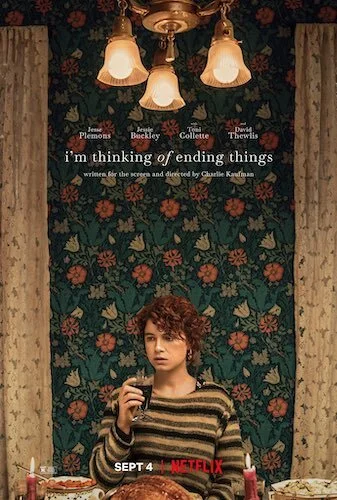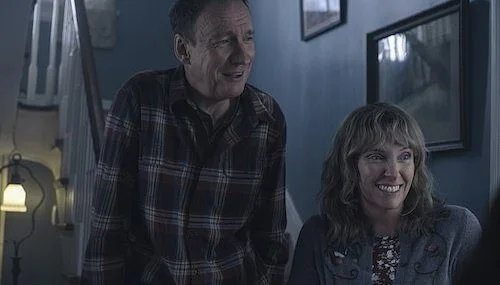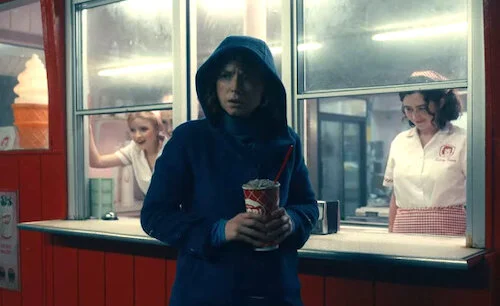I'm Thinking of Ending Things
Warning: This review won’t reveal explicit spoilers, but it will discuss the nature of the film, which is unique enough — and displayed secretively — to be considerably important to not know going into this film. Reader discretion is advised.
Charlie Kaufman was never a writer that was going to give you a straightforward narrative, let’s be honest. Somehow, Kaufman has been able to extract humanism from the most abstract of concepts, likely because he finds loneliness and fear in every little shard and nurses it. Considering his work thus far, one would think Kaufman was the most depressed auteur in the world. Maybe this is just how he channels those feelings we all experience and wish not to share. Usually, however, Kaufman has some sort of semblance to his visions, no matter how bizarre they might be. Synecdoche, New York is the effort to have all of the actors in a play have their own main storyline, only to realize that they are of no importance to the narratives of others. Anomalisa is completely told by figurines, but we understand this is the mundane perception of a family man searching for more meaning.
I’m Thinking of Ending Things is a rare moment in Kaufman’s canon where not everything lines up entirely on purpose. Even in his screenplays directed by other filmmakers, Kaufman sews everything up so we know this unique take on our universe makes sense. Not in this latest feature. It enjoys its empty spaces, and it’s an instance where we have to piece together these series of thoughts ourselves. Of course this film is going to get strange, considering who has made it. Being this lost in a Kaufman film is actually kind of a luxury, oddly enough. I personally could never get tired of Kaufman’s stories, but having one that doesn’t spoon feed you how these worlds work is so different. I won’t say this gets into Lynchian territory (a terminology that gets overused for anything that’s surreal, anyhow), but it almost feels slightly like Tarkovsky; perhaps a Mirror offshoot.
The “young woman” and Jake fighting the blizzard.
At its core, I'm Thinking of Ending Things is Kaufman’s most complicated idea to date. It is the literal infusion of timelines, thoughts, dreams, desires, and fears. Since the unnamed young woman lead character is hoping to end her relationship with Jake, we start off the film waiting to see how this goes. Quickly (but not too quickly), the film starts to reveal its peculiar nature. Memories and the present get intertwined, almost like everything is merging on a molecular level. A poem that is discussed is clearly written by someone else, as is revealed later on. But then, we see this kind of event happens a lot here. Paintings done by another artist are confused as being the works of a protagonist. The performance of Oklahoma! gets integrated into the lives of the characters. A copy of A Beautiful Mind is shown; well, you know that a part of this film will become a turning point here (and it does). I'm Thinking of Ending Things goes beyond confusing its characters thoughts. It turns in on itself like a wave crashing onto a shore, mixing all of the salt and water particles — amongst other debris — together, and allowing it all to exist the same but differently.
So what does this have to do with relationship woes, and having to meet a significant other’s parents? The young woman dives into her thoughts a lot, and we can hear them out loud (that seems to be the shtick at first, but boy are we wrong). We eventually start to see images cycle in the same way that cultural works do. Then, the characters themselves begin to exist very unusually. People leap in age, as if we’re experiencing the present but at different times; even with these jumps in time, we’re still dealing with current issues, like chaining the tires to embrace the blizzard. Testaments become different, too; memories are recollected differently, as if the first time they were told wasn’t the real story, but no one was lying. This film reminds me specifically of two post modern greats. Firstly, Certified Copy, and its smushing of an entire lifetime into one single evening. Secondly, Last Year at Marienbad, and the promise that memories are only as truthful as they are to us at this very second (they will forever shift).
Jake’s overly optimistic parents, trying to make a great impression on his date.
So, the easiest way I can explain I'm Thinking of Ending Things is to describe it as such: it is as if the linearity of time and memory didn’t exist. What if the woman never accepted Jake’s proposal to go out on a date? What if they stay together, despite her wanting to call things off? What if we could live all of these possibilities at the same time? What if these outcomes also involve the outcomes of every player featured here, in the histories of every character? An early discussion involves the clinging onto life, but how life isn’t important to all (but their death is usually for the life of their community). Synecdoche, New York focuses on every individual life. I'm Thinking of Ending Things clashes everything together, allowing for lives to break, and reassembles everything together to embrace all of the imperfections. This is for the betterment of the community here.
Of course, this could only be possible through Kaufman’s writing, and this is another adaptation Kaufman style (see, well, Adaptation. for more information). Based on Iain Reid’s story of the same name, Kaufman at least contains a bit of the original format of this tale before going off on his own tangent. Reid has an answer to all of the oddities in the film (which I won’t go into detail, as to not spoil either story). For Kaufman, this only plays into his need to split the functions of a story apart. The mystery of the original story is just a mystery. For Kaufman, this is a philosophical question that was meant to be dissected, and he goes fully into this. It’s strange — but not unlike Kaufman — that his most ambiguous film ever actually had a source material. Like the characters here, it’s as if Kaufman just merged himself with Reid, allowing both lives to coexist in this mutt of a film.
The “young woman” experiencing dread at the counter.
What’s especially funny is how I'm Thinking of Ending Things even toys with the idea that there is something extra here, as a warning is given later on: essentially, be careful. We’re told this, as a fake promise that everything will come around. Rather, I read this warning as a reminder to keep living, because time runs out. Use time wisely, because your memories continue to become you, as does your unpredictable future. You are all of your beings at once. Ending a relationship doesn’t end it becoming a part of you (or the chance that it never even began in the first place). We are all of our insecurities, and our dreams are just our avoidances of the parts of us that scare us the most.
When I'm Thinking of Ending Things gets extremely strange towards its end, it’s the beautification of the inner dread we all are cursed with. There’s no easy explanation, because it’s the furthest into the unknown of his own psyche that Kaufman has ever been willing to go, and I consider that a beautiful thing. The slightly different reception the film has received — while still great — feels reminiscent of the legacy that Synecdoche, New York had. All of the misreads that latter film had at the time ended up growing into a huge appreciation for Kaufman’s ability to capture the worst feelings of the human existence and make them breathtakingly stunning. I feel the same way of I'm Thinking of Ending Things. Give this film time. It’s going to be discussed a hell of a lot more than it’s even being discussed now.
Andreas Babiolakis has a Masters degree in Film and Photography Preservation and Collections Management from Ryerson University, as well as a Bachelors degree in Cinema Studies from York University. His favourite times of year are the Criterion Collection flash sales and the annual Toronto International Film Festival.









